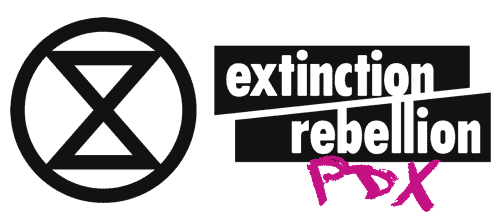The City of Portland is accepting written testimony on its proposed renewable fuel standard policy until Monday, October 3, 5 pm, and Extinction Rebellion is organizing citizen comment. Please put your comments here: https://www.portlandmaps.com/bps/testify/#/renewable-fuel-standard
This policy would accelerate the yearly increase in percentage of renewable fuels by volume, replacing 99% of petroleum diesel sold in the city with renewable fuels by 2026. See the draft policy explainer here: Draft policy BPS explainer. Here’s a Draft comment letter based on 2-pg outline prepared by the local fossil fuels watchdog coalition.
Talking points (to be developed into amendments to the policy):
- Switching to renewable diesel may cause a delay in much-needed transition to electrification. Even if industry claims were true, the emissions and pollution are only reduced, and it is likely to prolong the transition to cleaner vehicles.
- Renewable diesel is still diesel, with the known risks of spills, fires, seismic concerns and polluting emissions, particularly nitrous oxide and carbon monoxide. These risks would affect already highly impacted frontline communities along transportation corridors and production sites. Renewable facilities should develop standards addressing seismic concerns, pollution, noise and smell, open venting, and other public health and safety issues caused by transporting and storing these volatile materials. Local, state, and federal land use permitting mostly concerns the sale and purchase, not so much the storage and transport, of renewable diesel. An oversight group of scientists and knowledgeable inspectors along with City staff should make regular inspection visits to verify public concerns and hold companies accountable.
- Since there is no guarantee that renewable diesel production will actually decrease petroleum diesel production, an overall cap should be required on the total amount of diesel allowed to be stored and sold for local use. Diesel storage should not become export facilities adding to the climate crisis.
- Specific additions prohibiting other feedstocks (like the palm oil ban) must include information on dedicated crops, trees, etc. used. Companies should have to disclose what type of fuel is being utilized in the hydrogenation process.
- Modeling around carbon intensity is problematic; there is good reason for skepticism on the carbon intensity (CI) numbers. The Oregon Fuels program was put in place before the intricacies of biofuel modeling were understood and national standards developed, plus industry lobbying weakened the program even more than the problematic California standards. Even new models often do not adequately account for land use change or the timeframes for CO2 equivalency for methane (which may be used as the fuel in the hydrogenation process) and black carbon.
- More phase out actions and specific timelines need to accompany this policy, specifying how and when phase out will happen. Otherwise, this policy is likely to boost the renewable fuels industry, becoming a roadblock for those phase out efforts. A grading system that rates renewable diesel fuels, based on a number of critical factors and eliminating the ones with the highest CO2 equivalence is strongly recommended.

